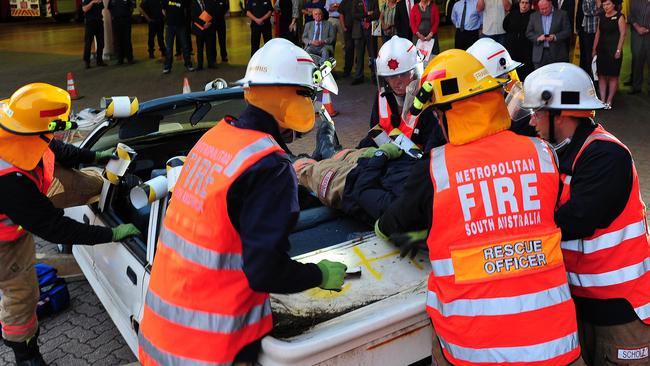Metropolitan Fire Service Health and Wellbeing Study shows significant mental health issues among firefighters
NEARLY one in five professional firefighters have a mental disorder and one in 10 experience suicidal thoughts, a landmark study has found.

SA News
Don't miss out on the headlines from SA News. Followed categories will be added to My News.
NEARLY one in five professional firefighters have a mental disorder and one in 10 experience suicidal thoughts, a landmark study has found.
And one in 20 Metropolitan Fire Service members experienced Post Traumatic Stress Disorder with the most common cause being continually exposed to bad injuries or fatalities and witnessing mass casualties.
The MFS and University of Adelaide conducted a systematic study into the mental and physical health of 578 MFS firefighters, who volunteered to participate.
The results have prompted the MFS to establish a new department focusing on prevention and early intervention on firefighters’ wellbeing from existing mental health support.
Mental health first aid training will be given to all MFS personnel, as will a first responders training film that’s launched nationally this month.
The total combined cost for the two initiatives (training and the video) is estimated to be $94,000.
The study revealed:
THREE quarters of those surveyed reported seeing someone killed or badly injured and nearly half had someone close to them die unexpectedly;
TEN per cent of MFS members survyed reported having suicidal thoughts — a rate substantially higher than the general Australian community - but planning to commit suicide or actual attempts were exceptionally low;
A THIRD of MFS members surveyed had moderate to high levels of psychological distress, with mental disorders disrupting their family life, followed by their social circle and work.
ONE third of firefighters surveyed sustained a musculoskeletal injury while on duty.
The University of Adelaide’s Centre for Traumatic Stress Studies director and leader of the study Professor Sandy McFarlane said some fire services in Australia still have “highly prejudicial views that are quite stigmatising” for those suffering mental health issues.
”Cumulative exposure” to stressful incidents meant that over time firefighters found it “increasingly difficult” to handle their jobs, Professor McFarlane said.
“Sometimes you come across an incident that your training doesn’t cover it - it may be a decaptitated child or three children who had been rescued from a fire,” he said.
“If you have children you can come to understand how that experience can be very personal for you so if you go home to your family it’s not like going home every night.
“What we should understand is the common reaction is to become very emotionally numb and this impacts on families where they (firefighters) become emotionally withdrawn, more irritable, they don’t engage in empathatic ways ... and those are the costs that are more hidden.
“The challenge now is to optimise preventive measures so that those who volunteer their services to protect the community, are able to have a long career without adverse consequences to their mental and physical health.”
MFS chief officer Greg Crossman anticipated that other emergency services agencies across Australia will be able to take learnings from this study.
“We are ordinary people doing extraordinary things,” he said.
“It is not an easy task to look back through your career to recall and recount traumatic emergency incidents.”
SA Mental Health Commissioner Chris Burns commended the MFS leadership on prevention and early intervention to support their workforce before they reach a point of crisis.


